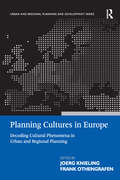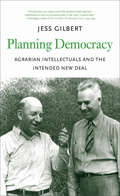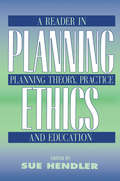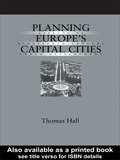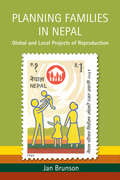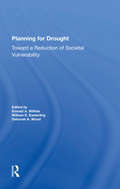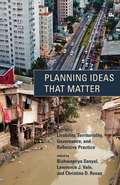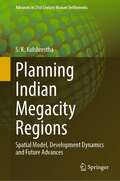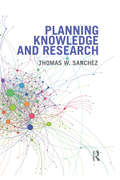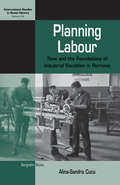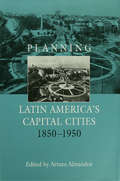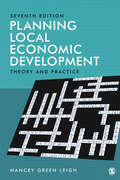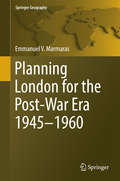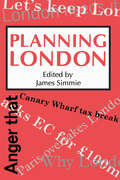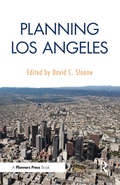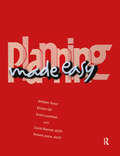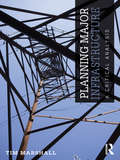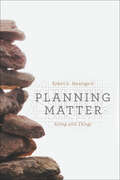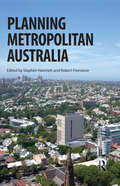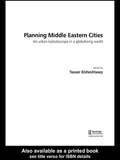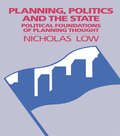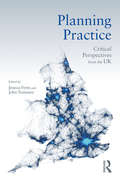- Table View
- List View
Planning Cultures in Europe: Decoding Cultural Phenomena in Urban and Regional Planning (Urban and Regional Planning and Development Series)
by Frank OthengrafenBringing together an interdisciplinary team from across the EU, this book connects elements of cultural and planning theories to explain differences and peculiarities among EU member states. A 'culturized planning model' is introduced to consider the 'rules of the game': how culture affects planning practices not only on an explicit 'surface' but also on a 'hidden' implicit level. The model consists of three analytical dimensions: 'planning artifacts', 'planning environment' and 'societal environment'. This book adopts these dimensions to compare planning cultures of different European countries. This sheds light not only on the organizational or institutional structure of planning, but also the influence of deeper cultural values and layers on planning and implementation processes.
Planning Democracy
by Jess GilbertLate in the 1930s, the U. S. Department of Agriculture set up a national network of local organizations that joined farmers with public administrators, adult-educators, and social scientists. The aim was to localize and unify earlier New Deal programs concerning soil conservation, farm production control, tenure security, and other reforms, and by 1941 some 200,000 farm people were involved. Even so, conservative anti-New Dealers killed the successful program the next year. This book reexamines the era's agricultural policy and tells the neglected story of the New Deal agrarian leaders and their visionary ideas about land, democratization, and progressive social change.
Planning Ethics
by Murray StrausOver the past fifty years professional understanding of planning has changed markedly. In the past, planning was primarily described as a technical activity involving data collection, analysis, and synthesis of physical plans and supporting policies. Now planning is seen as a much broader set of human activities, encompassing the physical world and also the realm of public and social services. Not surprisingly, planners' discussions of ethics have evolved. Professional ethics is regarded by many planners to be limited to a set of rules of behavior regarding interactions with the public, sources of data, government officials, and one another.This shift is symbolized by the evolution of the labels by which ethics is known: from a circumscribed view of professional ethics to a broader concept of ethics in planning; both of which are discussed in this book. Sue Hendler argues that planners recognize that every act of planning pursues certain human values and is a series of statements about what we take to be right or wrong and what we take to represent the highest priorities of the society.Planning Ethics explores planning within alternative moral theories, including liberalism, communitarianism, environmentalism, and feminism. The contributors illustrate the application of these ethical principles in specific planning contexts encompassing community development, land conversion, waste management, electric power planning, and education planning. This is the next generation of thinking on ethics and planning. It will be a centerpiece of every planning curriculum.
Planning Europe's Capital Cities: Aspects of Nineteenth-Century Urban Development (Planning, History and Environment Series)
by Thomas HallDuring the nineteenth century many of Europe's capital cities were subject to major expansion and improvement schemes. From Vienna's Ringstrasse to the boulevards of Paris, the townscapes which emerged still shape today's cities and are an inalienable part of European cultural heritage.In Planning Europe's Capital Cities, Thomas Hall examines the planning process in fifteen of those cities and addresses the following questions: when and why did planning begin, and what problems was it meant to solve? who developed the projects, and how, and who made the decisions? what urban ideas are expressed in the projects? what were the legal consequences of the plans, and how did they actually affect subsequent urban development in the individual cities? what similarities or differences can be identified between the various schemes? how have such schemes affected the development of urban planning in general?His detailed analysis shows us that the capital city projects of the nineteenth century were central to the evolution of modern planning and of far greater impact and importance than the urban theories and experiments of the Utopians.
Planning Families in Nepal: Global and Local Projects of Reproduction
by Jan BrunsonBased on almost a decade of research in the Kathmandu Valley, Planning Families in Nepal offers a compelling account of Hindu Nepali women as they face conflicting global and local ideals regarding family planning. Promoting a two-child norm, global family planning programs have disseminated the slogan, "A small family is a happy family," throughout the global South. Jan Brunson examines how two generations of Hindu Nepali women negotiate this global message of a two-child family and a more local need to produce a son. Brunson explains that while women did not prefer sons to daughters, they recognized that in the dominant patrilocal family system, their daughters would eventually marry and be lost to other households. As a result, despite recent increases in educational and career opportunities for daughters, mothers still hoped for a son who would bring a daughter-in-law into the family and care for his aging parents. Mothers worried about whether their modern, rebellious sons would fulfill their filial duties, but ultimately those sons demonstrated an enduring commitment to living with their aging parents. In the context of rapid social change related to national politics as well as globalization--a constant influx of new music, clothes, gadgets, and even governments--the sons viewed the multigenerational family as a refuge. Throughout Planning Families in Nepal, Brunson raises important questions about the notion of "planning" when applied to family formation, arguing that reproduction is better understood as a set of local and global ideals that involve actors with desires and actions with constraints, wrought with delays, stalling, and improvisation.
Planning For Drought: Toward A Reduction Of Societal Vulnerability
by Donald Wilhite William Easterling Deborah A. Wood Eugene RasmussonDroughts and their management are a serious challenge to water resource professionals. While droughts predominate in arid regions, their frequency and severity in more temperate regions with more abundant rainfall have been on the rise. Drought Management and Planning for Water Resources provides an essential collection of planning and management t
Planning Ideas That Matter: Livability, Territoriality, Governance, and Reflective Practice
by Bishwapriya Sanyal Lawrence Vale Christina RosanOver the past hundred years of urbanization and suburbanization, four key themes have shaped urban and regional planning in both theory and practice: livability, territoriality, governance, and reflective professional practice. Planning Ideas That Matter charts the trajectories of these powerful planning ideas in an increasingly interconnected world. <p><p> The contributors, leading theorists and practitioners, discuss livability in terms of such issues as urban density, land use, and the relationship between the built environment and natural systems; examine levels of territorial organization, drawing on literature on regionalism, metropolitanism, and territorial competition; describe the ways planning connects to policy making and implementation in a variety of political contexts; and consider how planners conceive of their work and learn from practice. <p> Throughout, the emphasis is on how individuals and institutions―including government, business, professional organizations, and universities―have framed planning problems and ideas. The focus is less on techniques and programs than on the underlying concepts that have animated professional discourse over the years. The book is recommended for classroom use, as a reference for scholars and practitioners, and as a history of planning for those interested in the development of the field.
Planning Indian Megacity Regions: Spatial Model, Development Dynamics and Future Advances (Advances in 21st Century Human Settlements)
by S. K. KulshresthaThis book focuses on spatial planning of megacities that are growing in Asia, Africa, and America. These cities are not be seen in isolation from their respective influence regions. They complement each other. Most of the solutions to the problems of such cities are found in their respective regions, and, on the other hand, the regions derive their strength from their respective megacities. There is a need for promoting integrated spatial planning of megacity regions. The five chapters in this book highlight the spatial planning of such regions.
Planning Knowledge and Research
by Thomas W. SanchezThe field of urban planning is far-reaching in breadth and depth. This is due to the complex nature of cities, regions, and development processes. The knowledge domain of planning includes social, economic, technological, environmental, and political systems that continue to evolve and expand rapidly. Understanding these systems is an inter-disciplinary endeavor at the scale of several academic fields. The wide range of topics considered by planning educators and practitioners are often based on varying definitions of "planning" and modes of planning practice. This unique book discusses various elements and contributions to urban planning research to show that seemingly disparate topics do in fact intersect and together, contribute to ways of understanding urban planning. The objective is not to discuss how to "do" research, but rather, to explore the context of urban planning scholarship with implications for the planning academy and planning practice. This edited volume includes chapters contributed by a diverse range of planning scholars who consider the corpus of planning scholarship both historically and critically in their area of expertise. It is essential reading for students of planning research and planning theory from around the world.
Planning Labour: Time and the Foundations of Industrial Socialism in Romania (International Studies in Social History #32)
by Alina-Sandra CucuImpoverished, indebted, and underdeveloped at the close of World War II, Romania underwent dramatic changes as part of its transition to a centrally planned economy. As with the Soviet experience, it pursued a policy of “primitive socialist accumulation” whereby the state appropriated agricultural surplus and restricted workers’ consumption in support of industrial growth. Focusing on the daily operations of planning in the ethnically mixed city of Cluj from 1945 to 1955, this book argues that socialist accumulation was deeply contradictory: it not only inherited some of the classical tensions of capital accumulation, but also generated its own, which derived from the multivocal nature of the state socialist worker as a creator of value, as living labour, and as a subject of emancipatory politics.
Planning Labour: Time and the Foundations of Industrial Socialism in Romania (International Studies in Social History)
by Alina-Sandra CucuImpoverished, indebted, and underdeveloped at the close of World War II, Romania underwent dramatic changes as part of its transition to a centrally planned economy. As with the Soviet experience, it pursued a policy of “primitive socialist accumulation” whereby the state appropriated agricultural surplus and restricted workers’ consumption in support of industrial growth. Focusing on the daily operations of planning in the ethnically mixed city of Cluj from 1945 to 1955, this book argues that socialist accumulation was deeply contradictory: it not only inherited some of the classical tensions of capital accumulation, but also generated its own, which derived from the multivocal nature of the state socialist worker as a creator of value, as living labour, and as a subject of emancipatory politics.
Planning Latin America's Capital Cities 1850-1950 (Planning, History And The Environment Ser.)
by Arturo AlmandozIn this first comprehensive work in English to describe the building of Latin America's capital cities in the postcolonial period, Arturo Almandoz and his contributors demonstrate how Europe and France in particular shaped their culture, architecture and planning until the United States began to play a part in the 1930s. The book provides a new per
Planning Local Economic Development: Theory and Practice
by Nancey G. LeighAuthor Nancey Green Leigh brings years of academic and professional experience to this classic text, which offers a comprehensive look at the basic tenets of local economic development planning. The book explores the theories of local economic development while addressing the issues and opportunities faced by cities, towns, and local entities in crafting their economic destinies within the global economy. The new Seventh Edition is updated with an increased focus on sustainability and equity, including local economic development issues arising from the global COVID-19 pandemic and significant shifts in the global economy.
Planning Local Economic Development: Theory and Practice
by Nancey G. LeighAuthor Nancey Green Leigh brings years of academic and professional experience to this classic text, which offers a comprehensive look at the basic tenets of local economic development planning. The book explores the theories of local economic development while addressing the issues and opportunities faced by cities, towns, and local entities in crafting their economic destinies within the global economy. The new Seventh Edition is updated with an increased focus on sustainability and equity, including local economic development issues arising from the global COVID-19 pandemic and significant shifts in the global economy.
Planning London for the Post-War Era 1945-1960
by Emmanuel V. MarmarasThis book deals with the formation of the post-Second World War reconstruction and planning machinery in Great Britain, the re-planning efforts undertaken in post-war London, and in particular the redevelopment programme regarding its central area in the form of the comprehensive development projects. Originating from a PhD Thesis, the book recreates the atmosphere following step by step arguments and events at various political, socio-economic and technical levels. It also contributes to the understanding of succeeding developments in terms of planning theory and practice. The book is structured into three parts. The first one explores the administrative and statutory developments in town planning matters during the period 1940-59. The second part deals with the plans proposed for London as a whole from independent and official organisations mainly during the 1940s. Finally, the third part examines the proposed projects for the rebuilding of the City of London and for special areas of Central London that suffered from bombing on both sides of the Thames.
Planning London: The Case Of London (Progress In Planning Ser.)
by James SimmieAn introduction to the problems and practices of planning in London. The authors address the question of what contributions the land-use planning system has made and could make to resolving decrepit public transport, congestion, noise, dirt, crime, poverty, begging, homelessness. They analyse these conflicts in terms of history, jobs, housing, transport and the quality of the environment - and considers future options.
Planning Los Angeles: Artists And Communities Working Together (Routledge Research In Planning And Urban Design Ser.)
by David C. SloaneLos Angeles isn’t planned; it just happens. Right? Not so fast! Despite the city’s reputation for spontaneous evolution, a deliberate planning process shapes the way Los Angeles looks and lives. Editor David C. Sloane, a planning professor at the University of Southern California, has enlisted 30 essayists for a lively, richly illustrated view of this vibrant metropolis. Planning Los Angeles launches a new series from APA Planners Press. Each year Planners Press will bring out a new study on a major American city. Natives, newcomers, and out-of-towners will get insiders’ views of today’s hot-button issues and a sneak peek at the city to come.
Planning Made Easy
by Carol Barrett William Toner Efraim Gil Enid Lucchesi Robert JoiceDeveloping a program to train planning commissioners and zoning board members takes a lot of time and effort. This manual makes the process easier. It covers the basics of community planning, zoning, subdivision regulation, and ethics. With chapters organized in discrete modules, it's ideal for both self-study and classroom use. Narratives explain general planning principles. Exercises encourage users to think about the planning issues in their communities. And worksheets reinforce important concepts. A complementary training guide, Training Made Easy, is also available. Planning Made Easy is published as looseleaf pages in a three-ring notebook.
Planning Major Infrastructure: A Critical Analysis
by Tim MarshallThis book analyses the planning and policy world of major infrastructure as it is moving now in Europe and the UK. Have some countries managed to generate genuine consensus on how the large changes are progressed? What can we learn from the different ways countries manage these challenges, to inform better spatial planning and more intelligent political steering? Case studies of the key features of policy and planning approaches in France, Germany, the Netherlands, Spain and the UK are at the core of Planning Major Infrastructure. This includes the different regimes introduced in England and Wales, and Scotland, brought in by reforms since 2006. High speed rail, renewable energy deployment, water management, waste treatment – all raise critical planning issues. The case studies connect to the big issues of principle which haunt this field of public policy: how can democratic legitimacy be secured? How can ecological and economic transitions be managed? What is the appropriate role of the national government in each of these areas, as against other levels? What part has the EU played, and should it be involved in the future? These are some of the central themes raised in this innovating exploration of this currently high profile field.
Planning Matter: Acting with Things
by Robert A. BeauregardCity and regional planners talk constantly about the things of the world--from highway interchanges and retention ponds to zoning documents and conference rooms--yet most seem to have a poor understanding of the materiality of the world in which they're immersed. Too often planners treat built forms, weather patterns, plants, animals, or regulatory technologies as passively awaiting commands rather than actively involved in the workings of cities and regions. In the ambitious and provocative Planning Matter, Robert A. Beauregard sets out to offer a new materialist perspective on planning practice that reveals the many ways in which the nonhuman things of the world mediate what planners say and do. Drawing on actor-network theory and science and technology studies, Beauregard lays out a framework that acknowledges the inevitable insufficiency of our representations of reality while also engaging more holistically with the world in all of its diversity--including human and nonhuman actors alike.
Planning Metropolitan Australia (Planning, History and Environment Series)
by Robert Freestone Stephen HamnettAustralia has long been a highly (sub)urbanized nation, but the major distinctive feature of its contemporary settlement pattern is that the great majority of Australians live in a small number of large metropolitan areas focused on the state capital cities. The development and application of effective urban policy at a regional scale is a significant global challenge given the complexities of urban space and governance. Building on the editors’ previous collection The Australian Metropolis: A Planning History (2000), this new book examines the recent history of metropolitan planning in Australia since the beginning of the twenty-first century. After a historical prelude, the book is structured around a series of six case studies of metropolitan Melbourne, Sydney, Adelaide, Perth, the fast-growing metropolitan region of South-East Queensland centred on Brisbane, and the national capital of Canberra. These essays are contributed by some of Australia’s leading urbanists. Set against a dynamic background of economic change, restructured land uses, a more diverse population, and growing spatial and social inequality, the book identifies a broad planning consensus around the notion of making Australian cities more contained, compact and resilient. But it also observes a continuing gulf between the simplified aims of metropolitan strategies and our growing understanding of the complex functioning of the varied communities in which most people live. This book reflects on the raft of planning challenges presented at the metropolitan scale, looks at what the future of Australian cities might be, and speculates about the prospects of more effective metropolitan planning arrangements.
Planning Middle Eastern Cities: An Urban Kaleidoscope (Planning, History and Environment Series)
by Yasser ElsheshtawyMiddle Eastern cities cannot be lumped together as a single group. Rather they make up the urban kaleidoscope of the title, as the diversity of the six cities included here shows. They range from cities rich in tradition (Cairo, Tunis, and Baghdad), to neglected cities (Algiers and Sana'a), to newly emerging 'oil-rich' Gulf cities (Dubai). The authors are all young Arab scholars and architects local to the cities they describe, providing an authentic voice with an understanding no outsider could achieve. These contributors move away from an exclusively 'Islamic' reading of Arab cities - which they regard as outdated and counterproductive. Instead, they explore issues of identity and globalization in the context of the struggles and solutions offered by each city from the late nineteenth century to the present day. Their focus is on how the built environment has changed over time and under different influences.
Planning Politics & State: Political Foundations of Planning Thought
by Nicholas LowFirst Published in 1990. Routledge is an imprint of Taylor & Francis, an informa company.
Planning Politics in Toronto
by Aaron Alexander MooreThe Ontario Municipal Board is an independent provincial planning appeals body that has wielded major influence on Toronto's urban development. In this book, Aaron A. Moore examines the effect that the OMB has had on the behavior and relationships of Toronto's main political actors, including city planners, developers, neighbourhood associations, and local politicians.Moore's findings draw on a quantitative analysis of all OMB decisions and settlements from 2000 through 2006, as well as eight in-depth case studies. The cases, which examine a variety of development proposals that resulted in OMB appeals, compare the decisions of Toronto's political actors to those typified in American local political economy analyses.A much-needed contribution to the literature on the politics of urban development in Toronto since the 1970s, Planning Politics in Toronto challenges popular preconceptions of the OMB's role in Toronto's patterns of growth and change.
Planning Practice: Critical Perspectives from the UK
by John Tomaney Jessica FermPlanning Practice: Critical Perspectives from the UK provides the only comprehensive overview of contemporary planning practice in the UK. Drawing on contributions from leading researchers in the field, it examines the tools, contexts and outcomes of planning practice. Part I examines planning processes and tools, and the extent to which theory and practice diverge, covering plan-making, Development Management, planning gain, public engagement and place-making. Part II examines the changing contexts within which planning practice takes place, including privatisation and deregulation, devolution and multi-level governance, increased ethnic and social diversity, growing environmental concerns and the changing nature of commercial real estate. Part III focuses on how planning practice produces outcomes for the built environment in relation to housing, infrastructure, economic progress, public transport and regeneration. The book considers what it means to be a reflective practitioner in the modern planning system, the constraints and opportunities that planners face in their daily work, and the ethical and political challenges they must confront.
